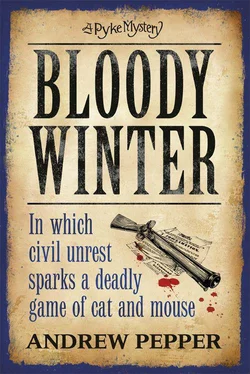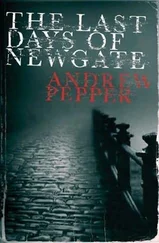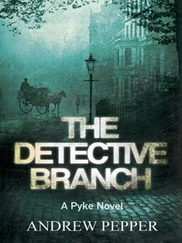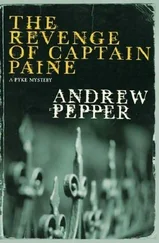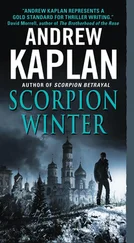Andrew Pepper - Bloody Winter
Здесь есть возможность читать онлайн «Andrew Pepper - Bloody Winter» весь текст электронной книги совершенно бесплатно (целиком полную версию без сокращений). В некоторых случаях можно слушать аудио, скачать через торрент в формате fb2 и присутствует краткое содержание. Жанр: Исторический детектив, на английском языке. Описание произведения, (предисловие) а так же отзывы посетителей доступны на портале библиотеки ЛибКат.
- Название:Bloody Winter
- Автор:
- Жанр:
- Год:неизвестен
- ISBN:нет данных
- Рейтинг книги:4 / 5. Голосов: 1
-
Избранное:Добавить в избранное
- Отзывы:
-
Ваша оценка:
- 80
- 1
- 2
- 3
- 4
- 5
Bloody Winter: краткое содержание, описание и аннотация
Предлагаем к чтению аннотацию, описание, краткое содержание или предисловие (зависит от того, что написал сам автор книги «Bloody Winter»). Если вы не нашли необходимую информацию о книге — напишите в комментариях, мы постараемся отыскать её.
Bloody Winter — читать онлайн бесплатно полную книгу (весь текст) целиком
Ниже представлен текст книги, разбитый по страницам. Система сохранения места последней прочитанной страницы, позволяет с удобством читать онлайн бесплатно книгу «Bloody Winter», без необходимости каждый раз заново искать на чём Вы остановились. Поставьте закладку, и сможете в любой момент перейти на страницу, на которой закончили чтение.
Интервал:
Закладка:
Knox hadn’t eaten anything since breakfast but said he would be there. Doheny patted him on the back. ‘It’s hard, isn’t it, when the side you’re on is not the side you want to be on.’
Knox wondered whether Doheny knew that he, too, was in favour of Irish independence and had even named his dog after a man who had done as much as anyone to further this particular cause.
The town hall was full to capacity by the time Knox had pushed his way to the front of the room; a heaving mass of pale flesh and damp kerseymere exuding the smell of stale sweat and tobacco. On the stage with Doheny and the Board of Guardians were representatives of the Pennefather family and Lord Cornwallis, who’d travelled from Dundrum to address the meeting. The Pennefathers and the Moores were the largest ratepayers in the county and therefore enjoyed a de facto right to sit on the Board.
As far as Knox could tell, an argument had broken out about who would subsidise the corn that Doheny had promised the protesters earlier.
William Carew, a trader, was complaining that if they sold his corn at the low price, he would make a loss and would have to be compensated using some fund made available by the Board. Doheny told him there was no money left. Carew repeated that he couldn’t afford to let the corn go at a loss. This led to further discussion about the ethics of the situation. Some accused Carew and his like of ‘naked profiteering’. This drew hot denials from the traders and the shopkeepers. Others blamed the Relief Commission in Dublin, and no one had a good word to say about the new Whig government in London, especially when it came to Sir Charles Trevelyan, head of the Treasury, who had publicly stated that it was up to the local boards and landlords, not the government, to provide poor relief. But the debate was predictable, and after fifteen minutes of wrangling nothing had been agreed.
‘ Dammit,’ Doheny shouted, eventually slamming his fist down on the table. ‘While we’re sitting here talking, men, women and children are dying every single day for the simple reason they can’t afford to eat.’
He was staring directly at Lord Cornwallis and for the first time all eyes turned towards the gnarled aristocrat.
Cornwallis cleared his throat and rose to his feet, turning away from the rest of the Board to address the crowded room. His bald head shone under the glare of the gaslight.
‘I come with a gift and a warning. The gift first: an additional one hundred pounds to the relief effort. This should, temporarily at least, defray the cost of the subsidy unwisely promised to the mob earlier today. But before I issue my warning, I feel compelled to clear up a few misunderstandings regarding the management of my estate. It is true I’ve been compelled to evict some unfortunate families from my land but only because the rent has fallen to such a low figure that the prospects for the estate have become imperilled. Reform is what’s called for; diversification. The old system is dead. No longer can we rely on that lazy root, the potato, to provide for all of our needs. Surely the last year is proof enough of that? Now, on my estate, there is land given over to pasture and grain. But I hear other whispers, too, efforts to impugn my family’s name. To some, I’m to be tarred with the same brush as other absent landlords. Apparently I care nothing for the plight of my tenants and sub-tenants. An absent landlord? Am I not here, addressing you? I am doing my bit, of course, as I should, but is it my responsibility alone to ensure that mouths in the county are fed? Look to the government. And before you think about pointing the finger in my direction, take notice of the money I have spent improving my estate, money which has filtered down to every single one of you.’
Cornwallis put his hands on his hips and stared out across the silent hall. He started to smile. ‘Now to my warning. Should the Board attempt to raise an additional levy against my estate, I shall have little choice but to redesignate my land as belonging to the neighbouring parish, which will mean, of course, that I’ll pay my rate there.’
As he sat down, the full implications of what he’d said started to ripple around the room. If Cornwallis withdrew his rate the workhouse could not be sustained and would have to close, forcing all five hundred men, women and children on to the streets. The result would be calamitous.
Afterwards, Knox was so deep in thought he didn’t notice Cornwallis approaching him until it was too late. The man’s face was glistening with perspiration and Knox could smell the wine on his breath.
‘I understand that your investigation is proceeding as per our discussion.’ He reached out and patted Knox on the face. ‘You’re a good boy, Michael. Loyal as they come. I mentioned this to your mother earlier today. She is very proud of you.’
Knox looked at the older man’s self-satisfied expression and had to rein in the urge to say what he really thought of him.
‘I shouldn’t wonder if it will be Head-constable Knox before very long. Who knows? Perhaps even sub-inspector one of these days.’
Knox stared down at his boots and again said nothing.
FIVE
TUESDAY, 17 NOVEMBER 1846
Merthyr Tydfil, South Wales
Pyke’s first impressions of the town were not very promising and a brief walk around it didn’t alter this perception. Merthyr was a squalid town trapped in a valley between three dirty mountains. If he’d arrived at night, someone said, the sight of jets of fire spurting up from the giant blast furnaces at the two great ironworks would have been impressive, but in daylight the place simply looked depressing, a grotesque man-made sore on an already bleak landscape.
In fact, to call the row upon monotonous row of squat back-to-back houses a town seemed to be a misnomer. Aside from a multitude of poorly constructed chapels, there were no public buildings or amenities of any note: no town hall, no fever hospital, no workhouse, no pavements, no gaslights, nothing to indicate that the civic spirit ran to anything more than letting the two ironworks do exactly as they wished. The High Street was pleasant enough, Pyke supposed, in a rather drab way, but he could see immediately that there were parts of the town where the squalor and degradation were as bad, if not worse, than anything he’d encountered in London.
On the train up from Cardiff, Pyke had sat next to a Chartist called Bill Flint. The radical had told Pyke that the town was booming on the back of a seemingly unquenchable thirst for iron, but that all the wealth was going straight into the pockets of the families that owned the largest ironworks: the Webbs of Morlais and the Hancocks of Caedraw. Merthyr, Flint had explained, was the biggest iron-producing town in the world. Wages were high, he acknowledged, compared with other parts of the country, but so were costs; private landlords were making a killing on rents and the truck system meant that workers had to spend their earnings buying overpriced goods at the company shop. What little remained went into the pockets of the publicans and brothel-keepers. At the last count, Flint said, there were five hundred beer shops and at least fifty brothels, the latter crammed into an area known as China. In turn, this had attracted swell mobs, pickpockets, thieves and gamblers from as far afield as Bristol and Liverpool.
Along the way, the police had lost control of parts of the town. But the ironmasters — to whom the police answered — didn’t seem to be particularly concerned about gambling and prostitution and cared only about excessive drinking after payday when the workers didn’t turn up for their shifts. It was the threat of industrial unrest that really frightened them, and there had been plenty of skirmishes over the years. The Merthyr Rising and the insurrection at Newport had been the most serious instances, and on each occasion soldiers had been called in to quell the unrest, with innocent men being shot and killed. On those occasions, Flint explained, the area had been suffering some of its leanest years and the men had been afraid for their jobs. Now, it was boom time and since there were more jobs than people to fill them, some of the radicals wanted to argue for higher wages. The town was awash with unsavoury types but the worst criminals of all were the ironmasters, Flint concluded. Perhaps not Sir Josiah Webb, who was well intentioned, but Zephaniah and Jonah Hancock were nothing short of pirates.
Читать дальшеИнтервал:
Закладка:
Похожие книги на «Bloody Winter»
Представляем Вашему вниманию похожие книги на «Bloody Winter» списком для выбора. Мы отобрали схожую по названию и смыслу литературу в надежде предоставить читателям больше вариантов отыскать новые, интересные, ещё непрочитанные произведения.
Обсуждение, отзывы о книге «Bloody Winter» и просто собственные мнения читателей. Оставьте ваши комментарии, напишите, что Вы думаете о произведении, его смысле или главных героях. Укажите что конкретно понравилось, а что нет, и почему Вы так считаете.
